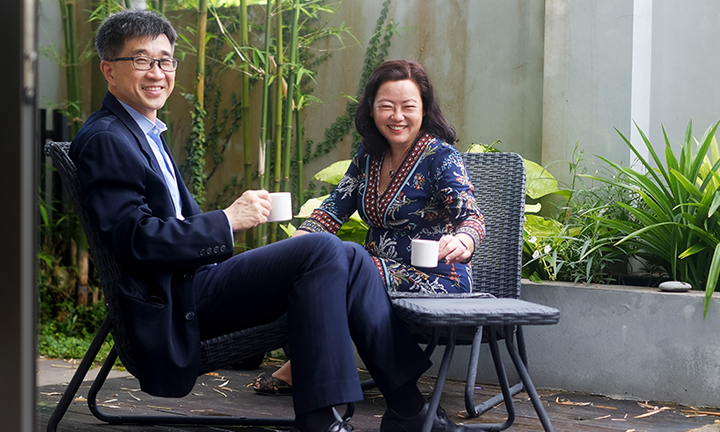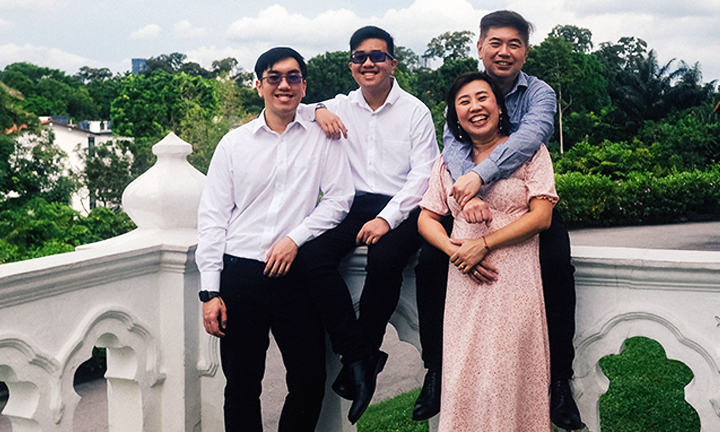Giving back without breaking the bank
It does not take a million dollars to start a named bursary. NTU alumni share their belief in uplifting needy undergraduates, and explain their motivations for giving back after toughing it out.
Text: Kenny Chee | Art Direction: Don Tan and Tan Hui Qin | Photos: Liu Aoyang
When Cheong Mun Hong (NBS/1989) and Gun Guat Kuan (NBS/1993) considered setting up an endowed bursary last year to help needy tertiary undergraduates, one concern was whether their donation would be a strain on them financially.
 Gun Guat Kuan (pictured with her husband Cheong Mun Hong), who funded her university education by borrowing money from her relatives and others.
Gun Guat Kuan (pictured with her husband Cheong Mun Hong), who funded her university education by borrowing money from her relatives and others.
But as Ms Lien Siaou-Sze, NTU’s Vice President for University Advancement, points out: “You might have the impression that setting up an endowment requires a gift to the tune of something like a million dollars. But you don’t actually need such a large donation to start one that can still go a long way to help students.”
The husband and wife realised that they did not need to fork out a huge sum or donate all at one go – they could pledge a minimum sum of S$150,000 for an endowed bursary and pay it out over three years. “Spreading the contribution over a few years helps. A lump sum donation would have been difficult – S$150,000 isn’t a small sum for us,” said Mun Hong, 57, the managing partner and founder of local accounting firm MHC Partnership LLP.
An endowed bursary is one where the capital sum donated is invested and kept in perpetuity. The distributable income from the investment is used to provide a dependable source of financial aid yearly and ensures the stability and long-term support to needy students.
Guat Kuan, 51, who works at PricewaterhouseCoopers, said that if their gift was too small, they might not be able to help students as much. “If the sum was too big, it would affect our day-today finances,” she said. So, splitting up their donation into smaller contributions over a period of time instead was ideal because it helped the couple to plan their cashflow better.
Another NTU alumnus, Moses Wong Seow Hiong (SPMS/2018), the Chief Financial Officer of SingHealth’s Agency for Logistics Procurement and Supply (ALPS), a public healthcare supply chain agency, also set up a S$150,000 endowed bursary last year. Established in his sons’ names, Moses, 57, said that the sum was still manageable for him as he has been doing well in his career.
He and his wife, Irene, are financially stronger now than when they were young and had to juggle studying and working at the same time. The couple grew up in low-income, single-parent families and their respective mothers had no time to give them much attention or guidance.
 Moses Wong and his wife, Irene, who came from humble beginnings but are now in a better financial position to establish an NTU bursary named after their sons.
Moses Wong and his wife, Irene, who came from humble beginnings but are now in a better financial position to establish an NTU bursary named after their sons.
“We know the sheer amount of financial freedom that a bursary can bring is life-changing. We hope this assistance can cover any gaps between the amount of money students need to attend school and any available government assistance that they are eligible for,” said Moses, who graduated from NTU in 2018 with a Master of Science in Analytics.
Moses added that he and his wife would like students to “be able to study without working full-time concurrently, having the ease of mind to focus on their academic pursuits to the best of their abilities”. Donations from well-wishers supported over 1,400 bursary awards for NTU undergraduates from July 2021 to June 2022.
Alumni have been donating over the last few years even during the pandemic for several reasons. These include reaching a stage of their lives where they are more financially able to help needy students, a greater awareness of setting up bursaries, and a desire to help students hit financially by COVID-19.
Said Moses: “We hope our bursary will help students from families affected by the pandemic and give them equal chances to further their education and fulfil their dreams.”
He believes that education is particularly important for financially needy students to secure a good job and to break out of the low-income cycle.
Moses' bursary, the Daren and Evan Huang SZ Bursary, will provide up to S$9,000 each year for an underprivileged undergraduate for the span of the degree programme in any NTU school.
Mun Hong and Guat Kuan’s bursary, called the Cheong Mun Hong and Gun Guat Kuan Scholarship, provides up to S$9,000 a year to needy undergraduate students from the Nanyang Business School, where they both graduated from.
The impetus for setting up the bursary came about in 2020 when Mun Hong was helping to interview applicants for NTU bursaries. He was inspired and impressed by needy students who contributed to society regularly, such as through community work.
Some students were also doing part-time work to cover expenditures like their university hostel fees and meals.
Mun Hong could relate as he has been volunteering for community work since his secondary school days. He grew up in a humble shophouse in Chinatown that housed eight families and his family only moved into a rented three-room Housing and Development Board flat when he was eight years old.
“I was very moved by these deserving students and wanted to set up a bursary to help them. So, I spoke with my wife, who agreed to chip in with me,” said Mun Hong. Guat Kuan had also faced financial difficulties but of a different nature. She came from a traditional family that was not in favour of funding the tertiary education of daughters. As a result, she had to borrow money from relatives and others to fund her university fees as her father would not support her financially.
“It took me the first two years of my working life to repay my relatives. So, I can appreciate the hardship that some students have to go through,” said Guat Kuan. “Everybody should have a fair chance at education, regardless of their gender. And if I can contribute to help, why not?”
Additional reporting by Janice Tai
Setting up a Bursary
One way to help students in need is to set up a named bursary. Such funds are usually named after the donors or people the donors want to honour.
There are two types of bursaries:
Endowed Bursary
The principal sum donated is invested for the long term to generate returns in perpetuity. Only the distributed income from the bursary’s investment is used to provide financial help to students. The minimum sum to set up an endowed bursary is S$150,000.
Term Bursary
The donated sum lasts only until the donated funds are used up. The minimum sum to set up a term bursary is between S$40,000 and S$50,000.
To learn more about named bursaries, as well as to discuss and plan your philanthropic aspirations, get in touch with the University Advancement Office at uao@ntu.edu.sg.
This article first appeared in issue 2 of U, the NTU alumni magazine.







